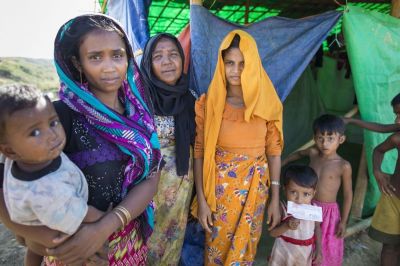We Must Serve the Most Persecuted People on Earth

Lumaisha's son is six months old but does not yet have a name. "I want to wait until he is doing better and is healthy again," she says. "That's when his life starts." A mother not naming her child for fear he will soon die seems astounding, but her story is all too familiar.
The plight of the Rohingya is no secret. From Secretary of State Rex Tillerson's recent visit to the refugee camp, to the Pope's visit to Myanmar this past week, the world is watching – and doing too little for those being called "the most persecuted people on Earth." The United Nations is calling it a "human rights nightmare" and not mincing words, charging ethnic cleansing.
Lumaisha's survival began with a trek over mountains to cross from Myanmar into Bangladesh, after her husband was killed when Myanmar's military set fire to their village. With no direction, supplies or food, Lumaisha clutched her sick, crying baby and fled. She is just one of 620,000 Rohingya who have escaped carnage since August, when Myanmar's hardline response to Rohingya militants quickly bled into routine violence against innocent Rohingya civilians, including arson, rape and murder.
Conditions in the Kutupalong refugee camp in Bangladesh are dire, too. Tens of thousands of new arrivals live in makeshift housing of donated bamboo sticks and plastic sheets. In areas where open defecation occurs, people wade barefoot through thick muck. It's a breeding ground for cholera and more.
Food for the Hungry (FH), partnering with Medical Teams International (MTI), is running two medical clinics in the refugee camps focused on treating the critically ill living in these crude conditions, like Lumaisha's son.
But we feel strongly that foreign assistance work must reach beyond administering desperately needed medical care. We are training community health workers so that the Rohingya can help their own sisters and brothers during this dark and desperate time.
"This is my way of ensuring that my community stays well and healthy," says Zahir, a refugee who volunteers as a community health worker. "I feel like I'm needed here, and I have an impact. The last weeks have been the hardest of my life, but my new position as [a] community health worker has made all the difference. I'm very proud of my work."
But he didn't always feel this way. At 21-years-old, Zahir's studies were abruptly interrupted when heavily armed, masked men surged into his Myanmar neighborhood, firing relentlessly and killing anyone in their path.Zahir ran, glancing back just long enough to see his village go up in flames. Several miles away, he was relieved to find his parents, who also made it out alive.
They trekked barefoot through the jungle and over coastal mountains, where they had to borrow 35,000 taka ($400) from a wealthy villager to pay to cross the water to Bangladesh in an old, flimsy boat. This is where the journey ends for many people because they drown.
At the chaotic and overflowing refugee camp, Zahir wandered aimlessly, until he became one of the first to sign up and receive training as a community health worker. Armed with a folder of images showing how to promote cleanliness, on an average day he visits up to five families, often directing acute diarrhea patients to the clinic, saving their lives. Worldwide, diarrhea is a leading cause of death of children under five. Only one clinic at the camp manages this deadly condition; in November, it handled nearly 5,000 confirmed cases.
FH's international team transformed what was originally a simple storehouse into a fully operational in-patient center within two days of arrival. For children like Hassan, a three-year-old who was one of its first patients, it was a matter of life and death. Clutching his mother's arm, the little boy slipped in and out of consciousness, sweat dripping from his tiny, exhausted body. But when his parents first arrived as refugees, they were afraid to seek medical attention. It was a community health worker who helped them feel comfortable and safe. Thankfully, Hassan has been successfully treated.
The horrors witnessed by the Rohingya we care for, and the severe trauma they carry with them, are difficult for most of us to fathom. Training Royingya community health workers is an important way in which collaboration makes inroads in caring for those suffering unbearable pain and hardship. Surely the global community, the faith community, and the American community must do more in the face of ethnic cleansing; we must work together so that Lumaisha's son might have a name.
Gary Edmonds is President/CEO of Phoenix-based Food for the Hungry.




























